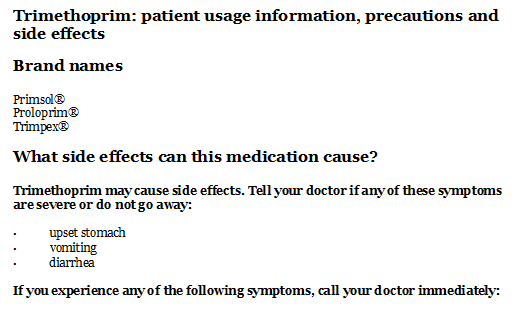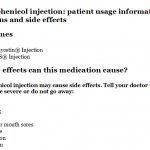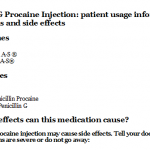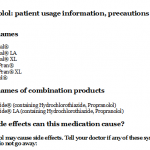
Trimethoprim: patient usage information, precautions and side effects
Tuesday, May 30, 2017 by Gregory Van Dyke
http://www.naturalnewsreference.com/2017-05-30-trimethoprim-patient-usage-information-precautions-and-side-effects.html

Trimethoprim: patient usage information, precautions and side effects
Brand names
Primsol®
Proloprim®
Trimpex®
What side effects can this medication cause?
Trimethoprim may cause side effects. Tell your doctor if any of these symptoms are severe or do not go away:
-
upset stomach
-
vomiting
-
diarrhea
If you experience any of the following symptoms, call your doctor immediately:
-
rash (hives)
-
itching
-
difficulty breathing or swallowing
-
sore throat
-
fever or chills
-
mouth sores
-
unusual bruising or bleeding
-
yellowing of the skin or eyes
-
paleness
-
joint aches
-
bluish-colored fingernails, lips, or skin
If you experience a serious side effect, you or your doctor may send a report to the Food and Drug Administration’s (FDA) MedWatch Adverse Event Reporting program online (http://www.fda.gov/Safety/MedWatch) or by phone (1-800-332-1088).
Why is this medication prescribed?
Trimethoprim eliminates bacteria that cause urinary tract infections. It is used in combination with other drugs to treat certain types of pneumonia. It also is used to treat traveler’s diarrhea. Antibiotics will not work for colds, flu, or other viral infections.
This medication is sometimes prescribed for other uses; ask your doctor or pharmacist for more information.
How should this medicine be used?
Trimethoprim comes as a tablet to take by mouth. It usually is taken one or two times a day. Trimethoprim may be taken with or without food. Follow the directions on your prescription label carefully, and ask your pharmacist or doctor to explain any part you do not understand. Take trimethoprim exactly as directed. Do not take more or less of it or take it more often than prescribed by your doctor.
What special precautions should I follow?
Before taking trimethoprim,
-
tell your doctor and pharmacist if you are allergic to trimethoprim, sulfa drugs, diuretics (‘water pills’, oral diabetes medications, or any other drugs.
-
tell your doctor and pharmacist what prescription and nonprescription medications you are taking, especially phenytoin (Dilantin) and vitamins.
-
tell your doctor if you have or have ever had anemia or liver or kidney disease.
-
tell your doctor if you are pregnant, plan to become pregnant, or are breast-feeding. If you become pregnant while taking trimethoprim, call your doctor immediately.
-
What special dietary instructions should I follow?
-
Take trimethoprim on an empty stomach, 1 hour before or 2 hours after meals. However, if you experience nausea, you may take trimethoprim with food.
Drink at least eight glasses of liquid (water, tea, coffee, soft drinks, milk, and fruit juice) every day.
What should I do if I forget a dose?
Take the missed dose as soon as you remember it. However, if it is almost time for your next dose, skip the missed dose and continue your dosing schedule. Do not take a double dose to make up for a missed one.
What should I know about storage and disposal of this medication?
Keep this medication in the container it came in, tightly closed, and out of reach of children. Store it at room temperature and away from excess heat and moisture (not in the bathroom). Throw away any medication that is outdated or no longer needed. Talk to your pharmacist about the proper disposal of your medication.
In case of emergency/overdose
In case of overdose, call your local poison control center at 1-800-222-1222. If the victim has collapsed or is not breathing, call local emergency services at 911.
What other information should I know?
Keep all appointments with your doctor and the laboratory. Your doctor will order certain lab tests to check your response to trimethoprim.
Do not let anyone else take your medication. Your prescription is probably not refillable. If you still have symptoms of infection after you finish the trimethoprim, call your doctor.
It is important for you to keep a written list of all of the prescription and nonprescription (over-the-counter) medicines you are taking, as well as any products such as vitamins, minerals, or other dietary supplements. You should bring this list with you each time you visit a doctor or if you are admitted to a hospital. It is also important information to carry with you in case of emergencies.
Tagged Under: Tags: chemical medicine, medication, Pharma, Prescription Medicine





